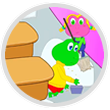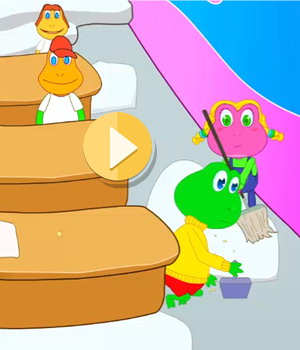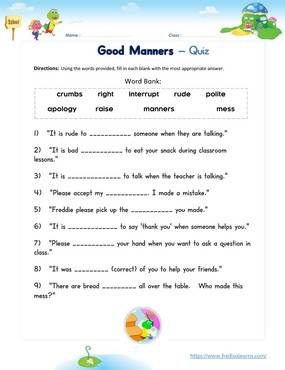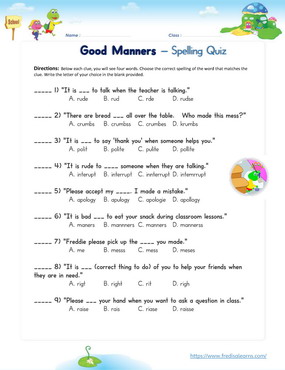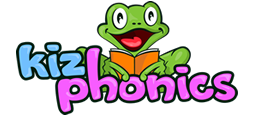Unit 7: Good Manners
Objectives:
- In this lesson, ESL kids learn how to talk about good and bad manners.
- The lesson teaches a number of adjectives followed by prepositions, used when talking about polite and rude behavior.
Main Lesson Materials & Study Steps
1st –This cartoon animated video features a short dialogue, followed by vocabulary and sentence breakdown. It is essential for introducing the words, phrases, grammar, spelling and sentences of the lesson in context. Watch repeatedly to master the content. The video plays on any device.
2nd – Then the student plays this fun game after watching the video, to practice the contents of the lesson. The game reviews key vocabulary, grammar and sentences from the lessons. This game can be played on any device.
3rd – Finally the learner takes this test of the unit. The score of this test is captured in the LMS and gives educators an idea of how well their learner is doing. The test opens on any device – mobile & PC.
Worksheets for the Unit
The worksheets below are useful for offline and classroom activities. These printable exercises directly correlate with the above lesson 'Good Manners'. Every worksheet comes with an answer sheet on the second page for educators.
Already a Member?
Not a member yet?
Lesson Story:
Freddie is feeling very hungry and decides to eat his snack during lessons. Ms. Ann is not amused and teaches Freddie and the other students about good and bad manners. Freddie is not at his best today and doubles down on his bad behavior by spilling his crumbs everywhere. Ms. Ann asks that he clean up the mess. Lisa helps him to do it quickly. These actions derail the math lesson of the day, leading Ms. Ann to teach them about good and bad manners instead.
Vocabulary:
| · snack |
| · eating |
| · crumbs |
| · mess |
| · hungry |
| · good manners |
| · bad manners |
| · polite |
| · rude |
| · quiet |
| · interrupt |
| · apology |
Collocations - verb and noun
| accept | your apology |
| raise | your hand |
| pick up | the mess |
Sentences - adjectives followed by prepositions & infinitive
| It is polite to say 'thank you'. |
| It is rude to interrupt someone when they are talking. |
| It is rude to talk when the teacher is talking. |
| It is right for you to say you're sorry when you make a mistake. |
| It is right of you to help Freddie. |
This lesson is part of the Level 7 English course.

